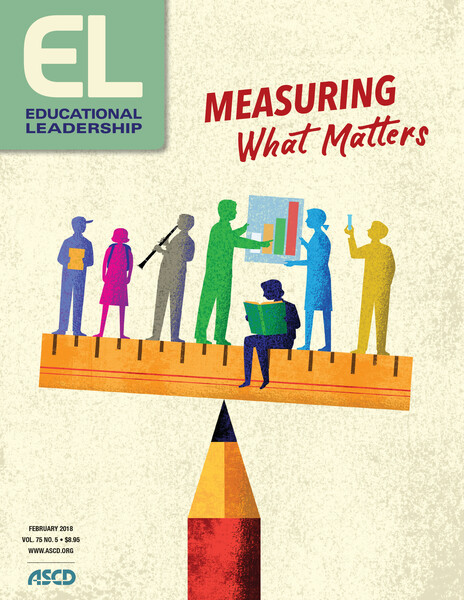School can sometimes feel like a Pac-Man game in which students gobble up points but have lost sight of what those points represent. My students' myopic focus on points and grades has been an ongoing source of frustration for me. Without realizing it, my traditional approach to grading had encouraged this misplaced focus on points.
Four years ago, I was logging more than 100 assignments in my online grade book by the end of each semester. Students received points for everything from completing assignments to bringing in materials. As a result, students' grades were a more accurate reflection of their organization and motivation than of their skill levels. I felt uneasy about the fact that some students were receiving As but were not demonstrating proficiency, while other students received Cs because of missing assignments even though they had demonstrated mastery. This was a problem.
My Shift to Standards-based Grading
At first, the prospect of shifting to a standards-based grading system was terrifying. I worried that students would not do the work if it wasn't "worth something." However, the more I learned about standards-based grading, the more convinced I became that it would shift the focus from the accumulation of points to the quality of learning. Instead of averaging assessment scores, participation, and effort as in a traditional model, standards-based grading aligns assessments to specific standards, and the most recent assessment scores count toward a student's grade. This approach values the development of skills over the accumulation of points and seeks to measure mastery of those skills.
As I embraced this new approach to assessing my students, I recognized the following three truths about learning.
1. Students need different amounts of practice to master a skill.
Too often students in the same class are given the same assignments. Most assignments are designed to help students practice and hone specific skills. Some students require a lot of practice and others do not. It's not surprising that a one-size-fits-all approach to learning creates frustration and kills motivation. Students who don't need a lot of practice become discouraged when they are assigned tasks that feel repetitive or unnecessary, while other students may not get the feedback and practice they need. Practice should be customized with the goal of supporting individual students in their journeys toward mastery.
Technology makes it possible for teachers to provide students with additional practice without making every student complete the same tasks. In math class, students can log into Khan Academy and practice at their own level, at their own pace. In English class, tools like Vocabulary.com and NoRedInk provide individualized vocabulary and grammar practice. These tools, many of which offer robust free versions, allow teachers to personalize practice.
When I introduce a new vocabulary list, I load the new words into Vocabulary.com. The site allows me to decide how long the kids can practice those words, and I set that date range to open the day I load the words and to not close until the day of the assessment. The platform's adaptive software generates practice activities for students that adjust to each user's performance. I encourage students to use this tool in class or at home, but I don't track their time online. Some students spend a few minutes reviewing words, while others practice for hours. They each decide how much practice they need to prepare for the assessment.
2. Grades should be an accurate reflection of a student's current ability.
Too often grades are an average score of work spanning an entire grading period. If a student dramatically improves his or her skills, that may not be reflected in the final grade. However, when only the most recent assessment scores appear in the grade book, grades are an accurate reflection of a student's current skills. This is a powerful incentive for them to do their best work on each assessment.
This also changes the student-teacher dynamic in class. Students are more likely to seek help and support as they work on developing specific skills. As a result of this grading model, I see myself more as a coach. I provide instruction, usually in the form of videos students can watch at their own pace. I focus my energy on providing individualized support as students work. I offer optional skills stations in class, where students who are struggling can come and work with me to get additional instruction, support, and feedback.
3. Learning is ongoing.
One of the challenges I've faced in moving to standards-based grading is that students who work hard don't necessarily earn As. The traditional grading model rewards students for doing every assignment, even if they do not demonstrate mastery. I've had students who always receive As in more traditional assessment models be outraged at receiving a B in my new system.
But it's when this happens that the the real learning opportunity presents itself. I make it clear on the first day of school that students are welcome to return to their work and improve it to show growth. If I assess a piece of formal writing and a student receives 2s and 3s out of 4, they can return to their essay and revise it using the rubric as a guide. Unlike other classes, where the assessment score is the end of the story, I tell students their assessment scores are simply an indication of where they are right now. The goal is for them to take the initiative to develop as learners.
At the end of each grading period, my online grade book spits out a grade based on my students' assessment scores. If a student is not happy with her scores, or if she returned to prior pieces of work to edit and improve them and believes the grade generated by my online grade book is not an accurate measure of her skill level, we have a "grade interview."
Students come to their grade interviews prepared with formal arguments, which mirrors our argumentative writing structure. They have three minutes to present a clear claim in defense of the grade they believe they deserve. Then they must present three pieces of evidence from their body of work that support their claim. If I have concerns or questions, I counter their claim. Then the student has an opportunity to close with a rebuttal addressing my concerns or answering my questions.
I enjoy these conversations because they encourage students to articulate their growth as learners and highlight the work they've done to develop specific skills. As a result, grades become a conversation instead of something that happens to them. They are responsible for their learning and progress. I cannot make them learn. I can only create an environment in which they want to learn.
My grading philosophy has evolved as I've attempted to align my grading practices with my purpose for being an educator. My "why" is to inspire a love of learning in every student. If that is my goal, my grading practices must emphasize continued learning, instead of the accumulation of points. I'm no longer using points as the carrot to get students to do work; I want them to see the value of that work and be intrinsically motivated to do it. I want the learning, not the grade, to be the reward.





